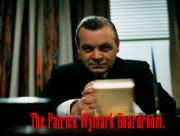
The Power Game
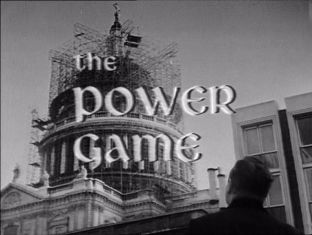
The Plane Makers and the role of John Wilder had made Patrick Wymark a star - one of Britain's first real TV stars. Several characters had observed that Wilder's motivation was power, so when he walked out of the aviation industry, the natural title of the follow-up was The Power Game.. There had already been a change of focus in the final series of The Plane Makers. Reginald Marsh's principled opponent to Wilder had been replaced by Alan Dobie's zealous engineer. And the shop floor characters had been marginalised in favour of Wendy Gifford's journalist/fixer and Peter Jeffrey's MP/PR man. These characters were left behind at Scott-Furlong, and the focus of the new series shifted almost entirely to characters within the board rooms of the construction industry. The new title sequence abandoned the documentary realism of The Plane Makers , for a more expressionistic concept of human chess pieces against the backdrop of St Paul's Cathedral.
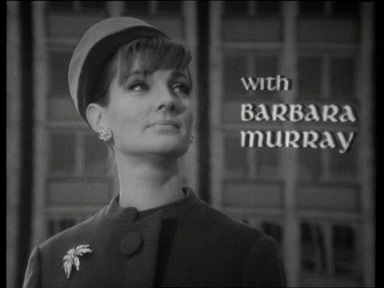
Barbara Murray returned as Pamela Wilder, now fixing Wilder with a defiant look to match her attitude.
Where Marsh and Dobie had been Wilder's contemporaries, his antagonist in "The Power Game" was veteran actor Clifford Evans (Professor Zimmer in "Kiss of the Vampire"). Uniquely, Evans does not appear in the main title sequence but has a shot at the very end, standing apart from the other characters as a counterpoint to Patrick Wymark.
Set in the era of Harold Wilson's Labour Government, aspiring to boost productivity through the Department of Economic Affairs and its National Plan, The Power Game found Wilder sitting on the National Export Board, a non-Governmental body aiming to encourage British industry to sell abroad.
As The Power Game opened, Sir John Wilder was finding the quiet life "beginning to pall a little". By the end of the first episode, Wilder has seen off Sir Gordon Revidge's attempt to nominate Sir Gerald Merle as joint managing director of Bligh Construction, putting himself in the seat. Taking advantage of the conflict between the firms founder, Caswell Bligh (Clifford Evans) and his weak but ambitious son Kenneth (Peter Barkworth), Wilder spent the first two series trying to gain ultimate control.
Talking to the Catholic Herald in 1966, Wymark said, "The whole idea of the programme is to show how, in big business, there are ruthless, ambitious, but not necessarily materialistically minded people. Most people think that big businessmen are only out for money. Well, so a lot of them are, but I think more big businessmen are out for power; control of other people, control of big business. And this programme, I hope, shows the conflicts that go on."
Season 1, Episode 1: The New Boy
Original Air Dateó13 December 1965
Written by Edmund Ward, directed by Victor Menzies
"You're in a depressed industry, Bligh. Every time the Government puts in a squeeze, the construction industry yelps."
For a longer Episode Review click here
Through stealth and cunning, Wilder manages to overturn an agreement between the domineering Caswell Bligh and Elbertson's merchant bank and have himself nominated as joint managing director with full control of the cash injected by the bank.
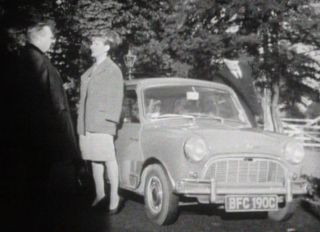
Season 1, Episode 2: Lady for a Knight
Original Air Dateó20 December 1965
Written by Raymond Bowers, directed by John Nelson Burton
Wilder throws himself into a new battle for power among the members of the National Export Board and comes up against civil service HEO and economist Susan Weldon (Rosemary Leach).
For a longer Episode Review click here
Season 1, Episode 3: Hagadan
Original Air Dateó27 December 1965
Written by Peter Draper, directed by Quentin Lawrence
For a longer Episode Review click here
"Living demands the continuous production of waste. We use up people as we use up everything else." John Wilder.
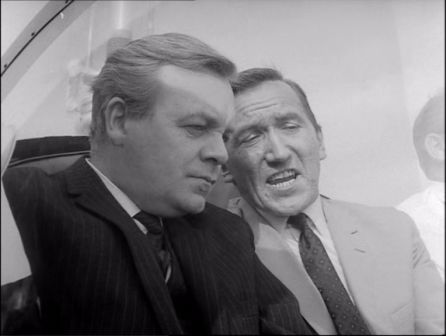
Wilder meets engineer Frank Hagadan (George Sewell) who has new ideas about road construction and puts him under contract.While Wilder takes more interest in Susan Weldon, Hagadan takes an interest in Pamela Wilder.
Season 1, Episode 4: The Politician
Original Air Dateó3 January 1966
Written by John Bowen, directed by David Reid.
For a longer Episode Review click here
Season 1, Episode 5: Point of Balance
Original Air Dateó10 January 1966
Written by Wilfred Greatorex, directed by Peter Collinson
For a longer Episode Review click here
Season 1, Episode 6: Saturday's Women
Original Air Dateó17 January 1966
Written by Raymond Bowers, directed by John Cooper
For a longer Episode Review click here
Season 1, Episode 7: The Switch
Original Air Dateó24 January 1966
Written by Edmund Ward, directed by David Reid
For a longer Episode Review click here
Season 1, Episode 8: The Crunch
Original Air Dateó31 January 1966
Written by Peter Draper, directed by John Cooper.As Frank Hagadan is about to unveil his new road-building machine, gossip spreads about his relationship with Lady WilderFor a longer Episode Review click here
Season 1, Episode 9: Late Via Rome
Original Air Dateó7 February 1966
Written by Wilfred Greatorex, directed by Peter Collinson For a longer Episode Review click here
Season 1, Episode 10: Persons and Papers
Original Air Dateó14 February 1966
Written by Peter Draper, directed by David Reid
Wilder is embarrassed to find that Frank Hagadan has taken a new job which brings them into contact again.For a longer Episode Review click here
Season 1, Episode 11: Trade Secrets
Original Air Dateó21 February 1966
Written by John Bowen, directed by Quentin Lawrence.For a longer Episode Review click here
At this point, Prime Minister Harold Wilson suddenly called a General Election, which Labour won on 31 March 1966 with a 48% share of the poll. As the Power Game dealt with political issues, the final two episodes were postponed, finally being broadcast in June 1966.
Season 1, Episode 12: The Man with Two Hats
Original Air Dateó13 June 1966
Written by Wilfred Greatorex, directed by John CooperFor a longer Episode Review click here
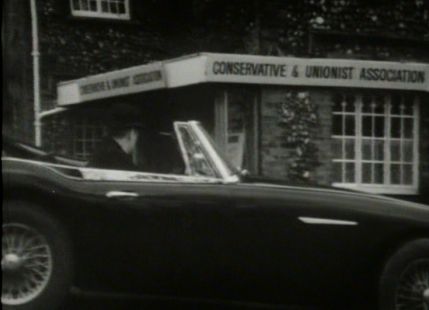
Don Henderson follows the money trail
"Would you believe it if I told you that our celebrated Socialist millionaire, who has carried a Labour party card for the past 35 years has been paying money out of this company into the Tory party?" While Caswell Bligh is away, Wilder calls in a special auditor who uncovers a scheme to ensure political support from both major parties.
Season 1, Episode 13: 'Confound Their Politics'
Original Air Dateó20 June 1966
Written by Edmund Ward, directed by Rex Firkin<For a longer Episode Review click here BR>Sir John Wilder finds himself on a political tightrope with efforts being made to force his resignation from the National Export Board.
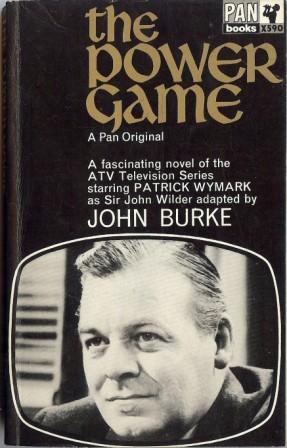
A novelisation of the first series by John Burke was published by Pan Books in 1966.For a Review click here
Season 2, Episode 1: Nothing's Free
Original Air Dateó26 September 1966
Written by Edmund Ward, directed by Peter Moffatt For a longer Episode Review click here
Sir John Wilder enters into negotiations with a Dutch/Italian consortium to secure backing for development of an Italian construction project.
Season 2, Episode 2: Ambassador Status
Original Air Dateó3 October 1966
Written by Peter Draper, directed by John Moxey For a longer Episode Review click here
Season 2, Episode 3: Grounds for Decision
Original Air Dateó10 October 1966
Written by Raymond Bowers, directed by David Reid. For a longer Episode Review click here
Season 2, Episode 4: The Front Men
Original Air Dateó17 October 1966
Written by Wilfred Greatorex, directed by Dennis Vance. For a longer Episode Review click here
Season 2, Episode 5: A Matter for Speculation
Original Air Dateó24 October 1966
Written by Edmund Ward, directed by John CooperFor a longer Episode Review click here
Season 2, Episode 6: The Big View
Original Air Dateó31 October 1966
Written by Peter Draper, directed by Dennis Vance
For a longer Episode Review click here
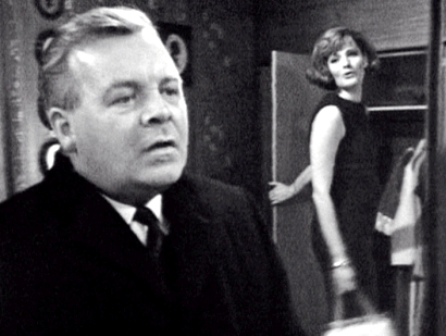
Season 2, Episode 9: Safe Conduct
Original Air Dateó21 November 1966
Written by Wilfred Greatorex, directed by John Nelson Burton
For a longer Episode Review click here .
Season 2, Episode 10: The Side of the Angels
Original Air Dateó28 November 1966
Written by Edmund Ward, directed by David Reid
For a longer Episode Review click here
Season 2, Episode 11: Tax Return
Original Air Dateó5 December 1966
Written by Raymond Bowers, directed by John Cooper
For a longer Episode Review click here
Season 2, Episode 12: Where Do I Want to Go?
Original Air Dateó12 December 1966
Written by Peter Draper, directed by David Reid
For a longer Episode Review click here
Season 2, Episode 13: There's No Such Thing as a Dead-Heat
Original Air Dateó19 December 1966
Written by Edmund Ward, directed by Rex Firkin
For a longer Episode Review click here
Playhouse:The Curtis Affair
Monday 15 January 1968
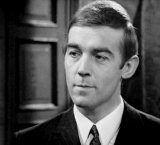
The "Missing Link" between series two and three of The Power Game, this one-off play by Wilfred Greatorex is directed by David Reid, who would go on to produce the third series. While the play features original characters, it picks up a theme from the penultimate episode of series two. Set entirely within a parliamentary committee, the play introduces Michael Jayston as an MP in conflict with tycoon Ranny Curtis (Andrew Keir). For a full Review click here
The Power Game: Special Envoy
After a two year break, the third series of The Power Game changed focus once more with the subtitle "Special Envoy". Wilfred Greatorex had written a treatment for two new series in late 1967, one about an Arms Dealer would form the basis for Hine in 1971, while "Ambassador At Large (Special Envoy) became the basis of the third series of The Power Game. Clifford Evans as Bligh and Patrick Wymark as Wilder were now working within the Government. Wilder as Roving Ambassador for Special Situations and Trade. Bligh as his Minister. Michael Jayston joined the cast as Lincoln Dowling, Wilder's civil service private secretary.
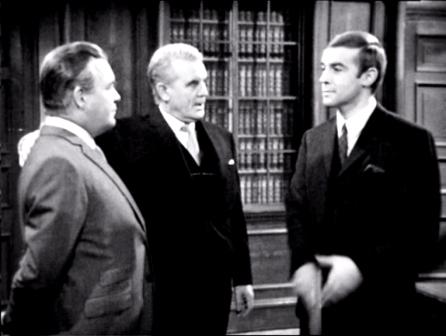
Season 3, Episode 1: Special Envoy: One Via Zurich
Original Air Dateó7 January 1969
Written by Wilfred Greatorex, directed by David Reid.For a longer Episode Review click here
Sir John Wilder faces a hostile press reception when he brokers a contract for a French company
Season 3, Episode 2: Special Envoy: The Big Nothing
Original Air Dateó14 January 1969
Written by Roy Clarke, directed by Cyril Coke
For a longer Episode Review click here
Season 3, Episode 3: Special Envoy: The Outsider
Original Air Dateó21 January 1969
Written by Wilfred Greatorex, directed by Peter Moffatt
For a longer Episode Review click here
Season 3, Episode 4: Special Envoy: The Goose Chase
Original Air Dateó28 January 1969
Written by Peter Draper, directed by Cyril Coke
For a longer Episode Review click here
Season 3, Episode 5: Special Envoy: Private Treaty
Original Air Dateó4 February 1969
Written by Raymond Bowers, directed by Robert Tronson
For a longer Episode Review click here
Season 3, Episode 6: Special Envoy: Without Prejudice
Original Air Dateó11 February 1969
Written by Raymond Bowers, directed by Peter Moffatt
For a longer Episode Review click here
Season 3, Episode 7: Special Envoy: Cat Is You, Bird Is Me
Original Air Dateó18 February 1969
Written by Peter Draper, directed by Robert Tronson
Wilder falls for 20-year old interpreter Perpetua Cataline (Felicity Gibson) when Fowler asks him to make a trip to Switzerland to meet banker with ideas about"paper gold".
For a longer Episode Review click here
Season 3, Episode 8: Special Envoy: Standard Practice
Original Air Dateó25 February 1969
Written by Raymond Bowers, directed by Robert Tronson
For a longer Episode Review click here
Season 3, Episode 9: Special Envoy: The Heart Market
Original Air Dateó4 March 1969
Written by Wilfred Greatorex, directed by James Ormerod
For a longer Episode Review click here
Season 3, Episode 10: Special Envoy: The New Minister
Original Air Dateó11 March 1969
Written by Wilfred Greatorex, directed by Cyril Coke
For a longer Episode Review click here
Written by Peter Draper, directed by Robert Tronson
For a longer Episode Review click here
Season 3, Episode 12: Special Envoy: Triangles
Original Air Dateó25 March 1969
Written by Peter Draper, directed by Peter Coke
For a longer Episode Review click here
Season 3, Episode 13: Special Envoy: Mergers
Original Air Dateó1 April 1969
Written by Wilfred Greatorex, directed by David Reid.
For a longer Episode Review click here
AFTER THE POWER GAME
The Power Game inspired a new genre of TV shows which stood aside from the formula of police and medical drama. Some of them were created by the same team behind The Power Game. You can read about them here